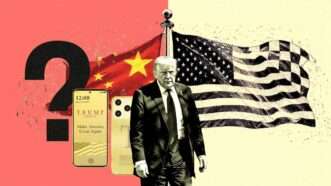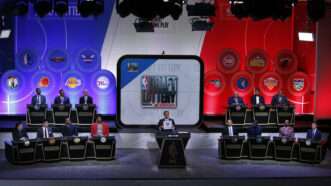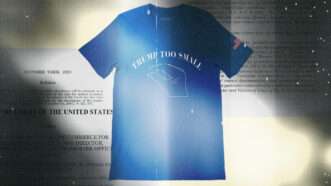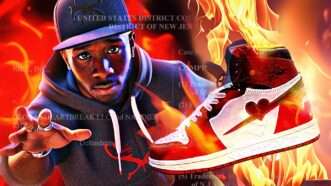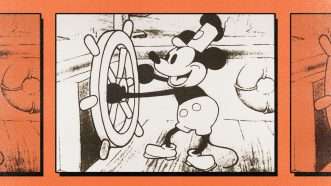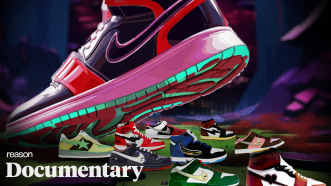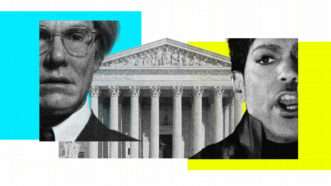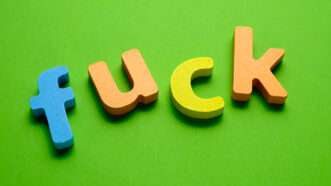Trademarks
How Much of Trump's 'Built in America' Phone Is Actually Built in America?
The Trump Organization says the phone is domestically manufactured, but its hardware—and a statement from Eric Trump—suggest otherwise.
Draft Lotteries Suck for Die-Hard Fans
Plus: Yetis, The Seat, and a political letter that will make your eyes roll.
Confusing Use of Another Political Group's Name as "Source Identifier" May Lead to Trademark Injunction
A dissenting subgroup of the Libertarian Party of Michigan was barred from "from identifying as the Libertarian Party of Michigan in the provision of services."
Supreme Court: You Can't Trademark Your 'Trump Too Small' T-Shirts
As Justice Sonia Sotomayor noted during oral arguments, the right to sell a shirt is different from the right to be the only one who can sell that shirt.
Justices Agree on Constitutionality of Trademark Restriction, Disagree on How to Approach Such Questions
The underlying methodological debate might also bear on free speech disputes more broadly.
Nike Sued Him for Making 400 Pairs of a Reimagined Air Jordan 1
"How small do you have to be for Nike not to care?"
Mickey Mouse Is Now In the Public Domain. Well, Sort Of.
Even though only one very specific version of the character is free to use, it still represents a positive step for creative expression.
Why Is Nike Stomping On Independent Creators?
Nike should welcome the reinvention of their popular shoes.
"This Case Pits Real Lawyers Against a Robot Lawyer"
"Spoiler: the robot wins for lack of Article III standing."
SCOTUS Decides Jack Daniel's v. VIP Products
Jack Daniel's prevails against dog toy maker.
S. Ct. Will Decide "TRUMP TOO SMALL" Trademark / First Amendment Case
The question: Does the First Amendment allow content-based but viewpoint-neutral restrictions on which trademarks may be registered—here, a restriction on marks that "[c]onsist[] of or comprise[] a name ... identifying a particular living individual except by his written consent"?
Supreme Court: Andy Warhol's Prince Prints Not 'Transformative' Enough for Fair Use
The case could have long-term implications for how broadly fair use can be applied.
'FUCK' Belongs to Everyone
The Trademark Trial and Appeal Board determined this week that an applicant cannot have the exclusive rights to everybody's favorite curse word.
Interesting Defendant Anonymity Opinion in Trademark / Parody / Gun 3-D Printing Controversy
And, even more exciting, there’s personal jurisdiction thrown in.
Ninth Circuit Upholds Dismissal of Arizona State's Trademark Lawsuit Over ASU_Covid.Parties Instagram Account
The account posted items such as (in mid-2020), "ASU: No More Social Distancing. No More Masks. It Is Time to Party!"
Now There's a Trademark Issue for You
"They should be paying us for burnishment—not suing us for tarnishment."
"The Law Has Already Sawed That Claim in Half"
The latest from Paul Alan Levy (Public Citizen), pushing back against threats of trademark litigation over parody.
The Trojan Doctrine: Trademarks and the Law of the Horse
I was just reminded of this short article of mine (published at 8 Tex. Rev. L. & Pol. 259 (2003)), and I thought I’d repost it here.
Inadequately Amend Your Complaint, End Your Complaint
Court dismisses Ice Cube's trademark lawsuit over Robinhood's use of his image and of a version of his "Check you self before you wreck yo self" line.
Trademark Confusion Lawsuit Over "ASU: No More Social Distancing. No More Masks. It Is Time to Party!" Posts
ASU loses, even though the defendant “stopped participating in this action after his answer was stricken” “for litigation misconduct”: “[A]a reasonably prudent consumer would not be deceived or confused into believing that ASU was the ‘source or origin’ of the posts and messages emanating from the ‘asu_covid.parties.’”
Some Potentially Racially Offensive Terms Can't Be Trademarked—Because They're Too Common, Not Because They're Racially Offensive
The Trademark Trial and Appeal Board rejects the mark “Nigga” for clothing, because it’s so commonly used by others that it doesn’t serve to identify the applicant’s products (logic that equally applies to "Team Jesus," "Texas Love," and "God Bless the USA").
DERBY-PIE Trademark Owner Can't Stop Newspaper from Discussing Other Derby Pies
An interesting illustration of the "non-trademark use" doctrine.
Go Walgreens!
Why are so many people in Washington DC walking around wearing Walgreens gear all of a sudden?

